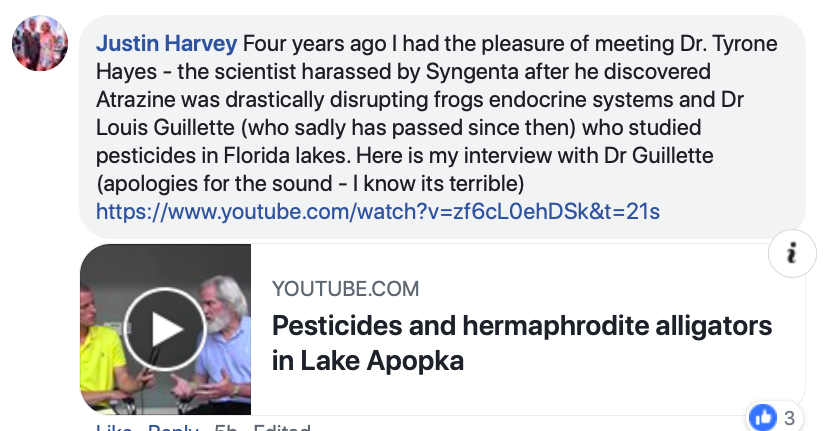Louis Guillette, Jr., Ph.D
Dr Louis Guillette explains his findings in Lake Apopka. During the mid-late 80's he began studying the reproductive biology of alligators in various Florida lakes. What he found in Lake Apopka included low birth rates and endocrine problems in alligators. By 1998 a chemical cocktail of pesticides used over many years made Lake Apopka one of the most toxic lakes in the US. From farmworkers developing various health problems including cancer to hermaphrodite alligators, Lake Apopka is no longer the premier fishing lake it once was known for. It is now referred to as "Pesticide Lake".
Every day, farmworkers across the county are exposed to a toxic brew of chemicals. One of the communities that has been impacted is Lake Apopka, Florida. This video tells their story. There is a better way to get our food from farm to table. Take action and learn more at the links above and below.
The idea of sustainability stands on three legs: the economy, the environment and social equity for the community. The Lake Apopka farmworker community is an example of an environmental justice community left behind in the policy and planning. It is not sustainable to address only the economy or only the environment. The Marsh Flow-Way Project and Lake Apopka Restoration Act were implemented to address the ecological issues such as the health of the lake but ignored the health and concerns of the people. Collaborations between community organizations like the Farmworkers Association of Florida and educational institutions like Florida A&M University College of Law are invaluable and can boost the strength and effectiveness of equity with regards to sustainability.
HBCUs are privy to the socio-economic and environmental plights of their student populations and the communities from which they come. They understand the importance of engaging the local communities in an effort to create innovative and interdisciplinary partnerships, to identify needs, solve problems and lead by example. Sustainable practices have been an integral part of the African-American community for centuries. Leadership exhibited by people like Professor Randy Abate and students like Cameryn Justice Rivera of FAMU College of Law and community activists like Jeanie Economos of the Farmworkers Association of Florida can collectively create comprehensive and sustainable solutions.
HBCUs are privy to the socio-economic and environmental plights of their student populations and the communities from which they come. They understand the importance of engaging the local communities in an effort to create innovative and interdisciplinary partnerships, to identify needs, solve problems and lead by example. Sustainable practices have been an integral part of the African-American community for centuries. Leadership exhibited by people like Professor Randy Abate and students like Cameryn Justice Rivera of FAMU College of Law and community activists like Jeanie Economos of the Farmworkers Association of Florida can collectively create comprehensive and sustainable solutions.
Endocrine Disrupting Contaminants and Reproductive Health: Alligators as Canaries in a Coal Mine by Center for Genetic Medicine


